外研版七年级下册Module 9重点内容复习总结
外研版丨七年级下册英语Module9~Module11知识点总结

2. 11 岁时,父亲去世。次年,他只开始了自己的写作生涯;
3. 他交友甚广,非常幽默。他一生写了大量作品,于 世。
1910 年 4 月 21 日去
Step 2 词汇联想
1. 工厂 factory
2. 幽默的 humorous
3. 辍学 drop out of school
第二部分 再按照时间顺序具体介绍马克· 吐温经历的事情。He dropped out of school and worked in a factory the next year. Then he did different jobs and began writing.
第三部分 最后再对马克·吐温简单总结一 下。 He wrote lots of works in his life. He died on April 21, 1910
Step 5 范文展示 Mark Twain Mark Twain was born in America in 1835 and he was one of the greatest writers in the world. His father died at the age of 11. He dropped out of school and worked in a factory the next year. Then he did different jobs and began writing. Mark Twain liked making friends with others and he was very humorous. He wrote lots of works all his life. He died on April 21, 1910. Module 10 ★重点单词 1. world-famous 举世闻名的 2. on holiday 度假 3. movie star 电影明星 4. the Pacific Ocean 太平洋 5. by plane 乘飞机 6. at the airport 在机场 7. such as 比如
外研版英语2022-2023学年七年级下册Module9重点知识

38 154 short poems
a few long poems
6、Like many people four hundred years ago, Shakespeare’s parents didn’t learn to read or write.
( B ) It’s important ____ a foreign language.
针对性训练
一、单项选择
( C)1. I’m sure I can _____ the truth one day.
A. look out
B. take out
C. find out
D. go out
( A)2. He went to America _____________ May 26th, 2017.
A. look for
B. find
D. find out
v. 原型 leave v. 原型begin "当…时候" 3、He left school and began work at the age of twelve.
at the age of “在……岁时”, 后面 直接+ 数字
at the age of ... = when sb. was/ were ... year(s) old
他变得很出名。(过去) He became famous. 他成为了一名著名的作家。 He became a famous writer.
4、But he took the name Mark Twain and became very famous in the 1860s.
in the 1860s
外研版七年级下册英语Module9重点单词短语、句型、语法汇总

外研版七年级下册英语Module9重点单词短语、句型、语法汇总★重点单词1.f i n d o u t发现;查明;弄清2.at t h e age of在……岁时3.i n t h e1860s在19世纪60年代4.ar o u n d t h e w o r l d世界各地5.W o m en's D a y妇女节6.N at i o nal D ay国庆节7.C h i l d r en's D a y儿童节★核心句型1.L o ok at t h i s!看看这个。
2.E n j o y t he bo o k.享受这本书。
3.S b d i d st h.某人做过某事。
4.D i d sb do st h?某人做过某事吗?5.l ear n t o d o s t h学习做某事6.d eci de t o d o st h决定做某事7.b egi n t o do st h开始做某事★语法点击动词的过去式是动词的重要形式,一般用于一般过去时态。
动词的过去式有规则变化和规则变化两种形式。
前一期,我们学习了动词过去式的规则变化,本期我们一起来探寻动词过去式的不规则变化。
过去式的不规则变化一般有以下几种情况:1.过去式与动词原形相同。
如:l e t-l et,p ut-p u t,c ut-c u t2.把动词末尾的字母d改为t。
如:sen d-sent,l en d-l en t,spen d-sp en t3.改变动词中间元音字母:(1)变i为a或o。
如:si t-sat,g i v e-g av e,be g i n-b egan,si n g-sa n g, s w i m-sw am,w i n-w on,r i d e-r o d e,d r i v e-d r o v e(2)变o/a为e。
如:d r aw-dr ew,k n o w-k ne w,g r o w-g r ew,t hr o w-t h r ew4.在动词原形后面加t。
中考英语外研版知识点分册总复习七年级(下) Modules 9-12
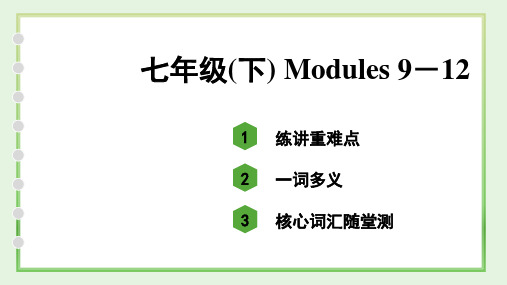
语法链接
1.不规则动词的一般过去式(肯定、否定与疑问句)(P92) 2.一般过去时的 wh-问句(P92) 3.祈使句(顺序与规则)(P134) 4.感叹句(P134)
一词多义
1.build ►熟义:①__建__造____ (v.) ►全国其他教材词义: ②He's of t 1 P2] __体__型__;__体__格__;__身__材___(n.)
A.voice
B.noise
C.sound
D.music
voice noise sound 13.I can't go over my lessons carefully because of the__n__o_is_e__ from the next room. 14.The mother always reads books for her baby in a gentle__v_o_ic_e__ at night. 15.At the foot of the mountain, you can hear the __s_o_u_n_d__ of the running water clearly.
all neither both either none 10.My parents and I didn't go out last night. __A_l_l__ of us stayed at home watching TV. 11.Mary invited Tom and Ann to have dinner together, but _n_e_i_t_h_e_r_ of them came.
考点抢测
16.I bought two T-shirts yesterday. One is pink, and ____D____ is
初中英语外研版七下Module9笔记讲解,巩固练习以及知识梳理

初中英语外研版七下Module9笔记讲解,巩固练习以及知识梳理外研版七下M9笔记讲解,巩固练习以及知识梳理Unit1笔记整理 By Zora1.辨析:find out,find与 look for①find out发现;查明;弄清,强调过程,多指通过观察、探索、调查等努力发现或弄清一些具体或抽象的东西②find 找到,发现,强调结果,通常指找到或发现具体的东西③look for 寻找,强调寻找的过程We must find out the truth.我们必须查明真相。
She found a good job at last.最后,她找到了一份很好的工作。
I'm looking for my key.我正在找我的钥匙。
2.at the age of 意为“在······岁时”,后接基数词,可位于句首或句末,常用于一般过去时,相当于when 引异的时间状语从句。
The old man died at the age of ninety.这位老人是在90岁时去世的。
【拓展】in+形容词性物主代词+整十的基数词的复数,表示“在某人几十多岁的时候”He lost work in his forties. 他在他四十多岁的时候丢掉了工作。
3.newspaper 可数名词,read newspapers意为“看报纸”。
4.exact adj.准确的,确切的I don't remember the exact words,我不记得确切的话了。
[拓展] exactly 副词,意为“准确地,确切地”5.date n.日期询问日期用 what.-What's the date today? -It's March 15th,6.take the name 意为“取名;起名”。
When did you take the pen name Shan He?你什么时候取了山河这个笔名?7.become 作连系动词,意为“变得”,后接形容词作表语。
外研版七年级下册Module 9重点内容总结
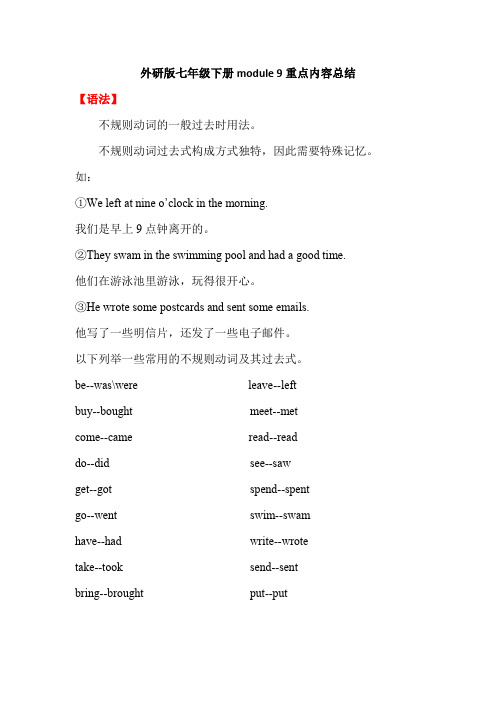
外研版七年级下册module 9重点内容总结【语法】不规则动词的一般过去时用法。
不规则动词过去式构成方式独特,因此需要特殊记忆。
如:①We left at nine o’clock in the morning.我们是早上9点钟离开的。
②They swam in the swimming pool and had a good time.他们在游泳池里游泳,玩得很开心。
③He wrote some postcards and sent some emails.他写了一些明信片,还发了一些电子邮件。
以下列举一些常用的不规则动词及其过去式。
be--was\were leave--leftbuy--bought meet--metcome--came read--readdo--did see--sawget--got spend--spentgo--went swim--swamhave--had write--wrotetake--took send--sentbring--brought put--put除了过去式的变化规则不同以外,不规则动词在肯定句、否定句、疑问句等各种句型中的使用与规则动词相同。
下面我们以spend,come,go,take,see,swim为例具体说明:肯定否定一般疑问句回答I spent two days here. I didn’t (didn’t)spendtwo days here.Did you spend twodays here?Yes,I did.No,I didn’t.You came here yesterday. You didn’t (didn’t)come here yesterday.Did you come hereyesterday?Yes,you did.No,you didn’t.He\She went to work by bus. He\She didn’t (didn’t)go to work by bus.Did he\she go towork by bus?Yes,he\she did.No,he\shedidn’t.It took two hours to go there. It didn’t (didn’t)taketwo hours to go there.Did it take twohours to go there?Yes,it did.No,it didn’t.We saw the famous film star. We didn’t (didn’t) seethe famous film star.Did we see thefamous film star?Yes,we did .No,we didn’t.They swam in the sea. They didn’t (didn’t)swim in the sea.Did they swim inthe sea?Yes,they did.No,they didn’t.【重点词汇】marry v. 结婚◆ He married in 1582 and had three children. 他在1582年结婚并且有三个孩子。
外研七年级下册第九模块知识点与模块话题作文复习课件(22张)
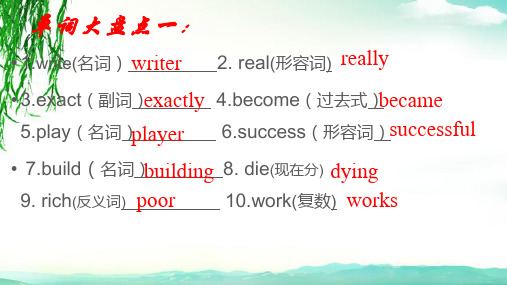
知识点大盘点:
一.by用法:
1.by+人被/由某人… The novel was by Luxun. 2.by +时间 到…为止 We must finish the work by four o'clock. 3.by+地点 在…旁边 There is a little house by the river . 4.by 靠,通过(方式,方法)I learn English by listening to songs. 5.by+交通工具 乘坐 We go to school by bus.
单词大盘点一:
• 1.write(名词) writer 2. real(形容词) really
• 3.exact(副词)exactly 4.become(过去式)became 5.play(名词)player 6.success(形容词)successful
Hale Waihona Puke • 7.build(名词)building 8. die(现在分) dying
9. rich(反义词) poor
10.work(复数) works
单词大盘点二:
英语12个月份:
1.一月January 2.二月February 3.三月 March
4.四月April 5.五月May
6.六月June
7.七月July 8.八月August 9.九月September
10.十月October 11.十一月November 12.十二月
B. at the beginning of
C, at the top of
D. at the bottom of
六、as well 与as well as 辨析
外研版七年级下MODULE-9-Life-History基础知识

MODULE 9 Life History1、at the age of在…岁时at the age of + 基数词=whe n sb was …years old=at age +基数词=at +基数词2、(all ) around the world 世界各地3、finish school 完成学业fin ish doi ng sth 做完某事4、A be difficult from B A 与B 不同5、十二个月份:in January on January 10th节日:Children' Day 儿童节National Day国庆节Women' Day 妇女节New Year's Day新年Teachers Day 教师节Labour/May Day劳动节on +节日on Natio nal Day如果月份,年份,节日前有this, n ext, every, last 时,不能加任何介词。
6、find out找出;查明,查清楚find 找到;发现7、as well as+名词/动名词也,同样as well也放在肯定句末尾8、a book by sb由某人写的书by被,由a song by sb由某人唱的歌9、write (sth ) for 为.... 写作write to sb给某人写信write about写…,写有关…a writer of plays and poems 剧作家和诗人10、take the name 取名11、become famous for sth-以…而变得出名be famous for sth 因…而著名be famous as sb 作为…而出名12> leave school 退学,离校13、at school在学校上学14、in many other Ianguages用许多其他的语言15、one's real name 真名16、exact date确切日期17、decide to be 决定成为decide to do sth /decide not to do sth决定做某事/决定不做某事18、in one'slife在某人的一生中all on e'slife 终生19、learn to do sth 学做某事20、marry sb. 与某人结婚marry v.get / be married 结婚married adj.get / be married to sb. 与某人结婚21、success n.成功successful adj.成功的successfully adv.成功地succeed v.成功succeed in doing sth 成功做某事22. beg in/start to do sth begi n/start doing 开始做某事23. die:死,去死,其过去式为died,现在分词为dying, 形容词为dead.1)die , dead , dying 区分die动词,强调“死”这一瞬间的动作,非延续性动词。
外研版(2012新版)七年级下册module9~module10知识点

他去了欧洲,然后又去了澳大利亚。
我出生于1995年,从小九决定要成为一名科学家。
他们在1880年重建了这栋建筑物,从那时起,就很多游客去参观。
我正在英语课上写一篇关于美国历史的文章。
Module101. Where are you going on holiday?To los Angles。
2. How long did it take to get there?It took me about nine hours.3. We were tired so we relaxed at home and began our tour of the city yester day.4. There were lots of tourists,so first of all,we had to wait in line for anhour,and then we went to the top.趁热打铁我两年前去过巴黎而且玩得很开心。
坐飞机去迪士尼要多长时间?你在哪里停留了多长时间?明天我们将会去参观著名的长城。
卢浮宫(Louvre Museum)有许多注明的艺术作品,例如Mona Lisa.主要语法Module 7—module10 一般过去时一、一般过去时表示的意义:1、表示过去某个时间发生的动作或存在的状态,常和表示过去的时间状语连用,如yesterday, last night, in 1990, two days ago等。
如:I got up at 6:30 yesterday. 我昨天6:30起床。
【动作】She was at home last night.. 她昨天晚上在家。
【状态】2、表示过去经常或反复发生的动作,常和often, always等表示频度的时间状语连用。
如:He always went to work by bus last year. 去年他一直乘公共汽车上班。
外研版英语七下第九模块《 Life history》重要知识点总结
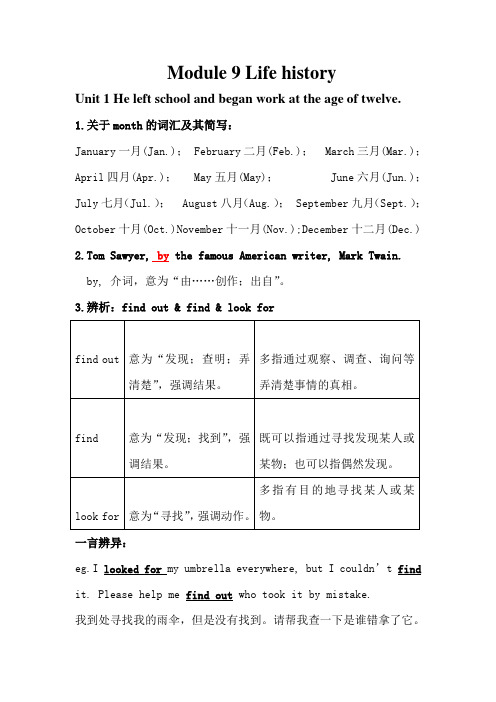
Module 9 Life historyUnit 1 He left school and began work at the age of twelve.1.关于month的词汇及其简写:January一月(Jan.); February二月(Feb.); March三月(Mar.);April四月(Apr.); May五月(May); June六月(Jun.);July七月(Jul.); August八月(Aug.); September九月(Sept.);October十月(Oct.)November十一月(Nov.);December十二月(Dec.)2.Tom Sawyer, by the famous American writer, Mark Twain. by, 介词,意为“由……创作;出自”。
3.辨析:find out & find & look for一言辨异:eg.I looked for my umbrella everywhere, but I couldn’t find it. Please help me find out who took it by mistake.我到处寻找我的雨伞,但是没有找到。
请帮我查一下是谁错拿了它。
4.“真实的”real(1)real,形容词,意为“真实的;真正的”。
real name,“真名”。
(2)really,副词,意为“确实;真正地”。
really happy,“确实很高兴”。
一言辨异:Tom really wants to make a real friend.汤姆真的很想结交一个真正的朋友。
5.age表达法at the age of +基数词 = at + 基数词,意为“在……岁时”相当于when sb. was... (years old)。
eg.At the age of 5/At 5,Jack could learn to read and write. =Jack could learn to read and write when he was 5 (years old). Jack 5岁时就学会了读书认字。
2023年外研社七年级英语下册模块9LifeHistory知识点归纳

外研社七年级英语下册模块9 Life History知识点归纳知识点一:模块9旳短语1. women’s Day妇女节2.National Day国庆节3.find out 发现,查明,弄清4.at the age of 在……岁时5.Children’s Day小朋友节6.New Year’s Day元旦7.Teachers’ Day教师节8.Spring Festival春节9.on the Internet在网络上10.be born出生11.as well也,还12.in the 1860s在19世纪60年代13.around the world世界各地14.get married结婚知识点二:重点词语解释Unit one1.Hey,we can find out about him on the Internet.嘿,我们可以在网上查明有关他旳资料。
find out意为“发现;查明;弄清”,后可接名词或从句。
如:Can you find out what time the plane takes of?你懂得飞机几点起飞吗?The students found out that their teacher was ill.学生们发现老师病了。
[辨析]find,find out,look forfind,find out和look for都具有“寻找,找到”旳意思,但其含义和使用方法却不一样。
(1)find意为“找到,发现”,一般指找到或发现详细旳东西,也可指偶尔发现某物或某种状况,强调旳是找旳成果。
如:He didn’t find his bike.他没找到他旳自行车。
(2)look for意为“寻找”,是有目旳地找,强调“寻找”这一动作。
如:I can’t find my pen. I’m looking for it everywhere.我找不到我旳钢笔,我正到处找。
(3)find out意为“找出;发现;查明”,多指通过调查、问询、打听、研究之后“弄清晰、弄明白”,一般具有“通过困难波折”旳含义,指找出较难找到旳、无形旳、抽象旳东西。
外研版七年级英语下册Module9词汇、知识点总结
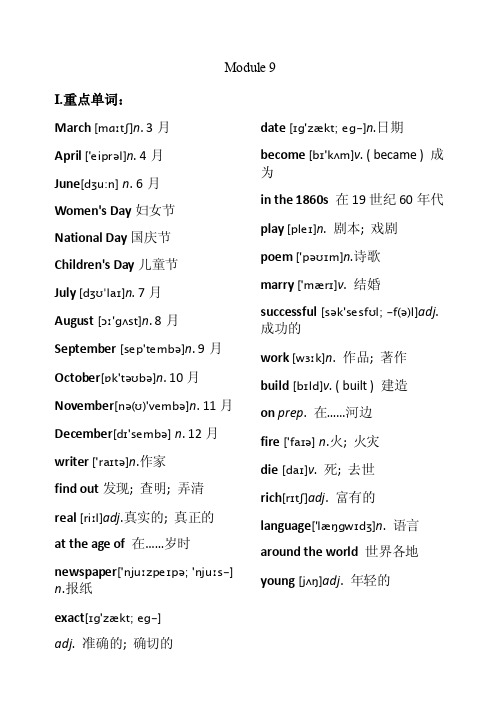
Module 9 I.重点单词:March [mɑːtʃ]n. 3月April ['eiprəl]n. 4月June[dʒu:n] n. 6月Women's Day妇女节National Day国庆节Children's Day儿童节July [dʒʊˈlaɪ]n. 7月August [ɔː'gʌst]n. 8月September [sep'tembə]n. 9月October[ɒk'təʊbə]n. 10月November[nə(ʊ)'vembə]n. 11月December[dɪ'sembə] n. 12月writer ['raɪtə]n.作家find out发现; 查明; 弄清real [riːl]adj.真实的; 真正的at the age of 在……岁时newspaper['njuːzpeɪpə; 'njuːs-] n.报纸exact[ɪg'zækt; eg-]adj. 准确的; 确切的date [ɪg'zækt; eg-]n.日期become [bɪ'kʌm]v. ( became ) 成为in the 1860s 在19世纪60年代play [pleɪ]n. 剧本; 戏剧poem ['pəʊɪm]n.诗歌marry ['mærɪ]v. 结婚successful [sək'sesfʊl; -f(ə)l]adj. 成功的work [wɜːk]n. 作品; 著作build [bɪld]v. ( built ) 建造on prep. 在……河边fire ['faɪə] n.火; 火灾die [daɪ]v. 死; 去世rich[rɪtʃ]adj. 富有的language['læŋgwɪdʒ]n. 语言around the world 世界各地young [jʌŋ]adj. 年轻的II.重点短语:1.月份:January February March April May June July August September October November December2.in January 在一月, 当有last ,next ,every ,this等词,时间前的on ,in 应去掉;具体到日期用介词on: on M arch 8th.3.at the age of=at +年龄=when sb. be …years old 在… 岁时4.marry sb .与某人结婚marry sb. to sb. 把某人嫁给某人be married to sb. 与某人结婚marry 是短暂性动词,不与时间段搭配,要用be married5.learn to do sth 学习做某事6.be worth doing sth .值得做某事7.be different from与…不同;the same as .与..相同8.successful 形容词, 动词:succeed , 名词successsucceed in doing sth. 成功做某事=be successful in doing sth.9.around the world=all over the world 世界各地10.as well as 和;同;既…又.. 与主语放在一起用就远原则11.on a boat 乘船=by boat12.节日:Teachers’s Day 教师节Children’s Day 儿童节Women’s Day 妇女节New Y ear’s Day 元旦Father’s Day 父亲节Mother’s Day 母亲节National Day国庆节Christmas Day 圣诞节民族节日前加the:the Spring Festival 春节the Mid-Autumn Day 中秋节the Dragon Boat Festival端午节13.begin ..with.以…开始begin to do sth .开始做某事begin doing sth .开始做某事14.work 作品,名词,可数; 工作,不可数15.die,死亡, 动词. 名词:death ,形容词dead,死的,无生命的,dying ,快要死的.16..find out意为“发现、查明、弄清”,多指通过调查、寻问、打听、研究之后搞清楚,弄明白。
外研版七年级英语下册短语及重点句型汇总(Module9)

外研版七年级英语下册短语及重点句型汇总(Module9)外研版七年级英语下册短语及重点句型汇总odule9Lifehistor【重点短语】attheageof在…岁时 2.SpringFestive春节3.Teacher’sDay教师节4.bedifferentfro与…不同5.oen’sDay妇女节 6.findout发现7.NationalDay国庆节8.ontheInternet在网上9.children’sDay儿童节10.asell 也11.Neyear’sDay新年12.leaveschool离开学校13.ayDay/LabourDay劳动节14.inanyotherlanguages用许多其他的语言15.halfanhour半小时16.halfpastfive五点半17.beorthdoing值得做18.getarried结婚【重点句子】I’ritingabouthiforyEnglishclass.我在写关于他的介绍,上英语课要用的。
ecanfindoutabouthiontheInternet.我们可以在网上找到关于他的资料啊。
Heleftschoolandbeganorattheageof12.他12岁就离开学校开始了工作了。
hatdidhedo?他做过什么?Idon’tnotheexactdate.我不知道确切的日期。
ButhetoothenaearTainandbecaeveryfaousinthe1860s.不过在19世纪60年代,他用了马克•吐温这个名字,并且变得很有名。
Lieanypeoplefourhundredyearsago,Shaespeare’sparentsdidn’tlearntoreadorrite.像四百多年前的许多人一样,莎士比亚的父母不识字。
Atschoolheliedplays,sohedecidedtobeanactorhenhefini shedschoolat14.在他14岁毕业的时候,他决定成为一名演员。
2023年外研新版英语七年级下册Module9LifeHistory知识点及练习含答案
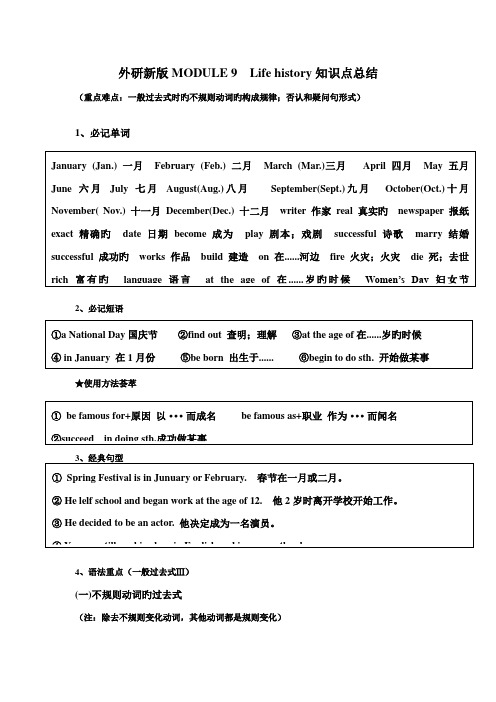
外研新版MODULE 9 Life history知识点总结(重点难点:一般过去式时旳不规则动词旳构成规律;否认和疑问句形式)1、必记单词2、必记短语★使用方法荟萃4、语法重点(一般过去式Ⅲ)(一)不规则动词旳过去式(注:除去不规则变化动词,其他动词都是规则变化)swim --- swam 游泳fly --- flew 飞run --- run 跑eat --- ate 吃have --- had 有buy --- bought买take --- took 拿teach ---taught 教go---went去sing --- sang唱歌do --- did 做read ---read 读书sweep ---swept 打扫make ---made制作set ---set sleep --- slept 睡觉get --- get得到,抵达draw --- drew画画drink --- drank喝write --- wrote写ride --- rode 骑put --- put 放tell ---told告诉send --- sent发送feel --- felt感觉think --- thought想meet --- met 会面fall --- fell落下wake --- woke 醒来(二)一般过去时旳否认句谓语动词为行为动词时,一般过去时旳否认旳构成为:主语+didn’t(did not)+动词原形(+其他)We didn’t go to school yeaterday.昨天我们没有去上学。
They didn’t stop working.他们没有停止工作。
He didn’t eat breakfast this morning.今天早上他没有吃餐。
★注意第9模块Life History综合检测题(时间:60分钟满分:100分)一、找出一列各组单词画线部分读音不一样旳一种。
(完整版)外研版七下Module9、10复习知识点梳理和练习(无答案)
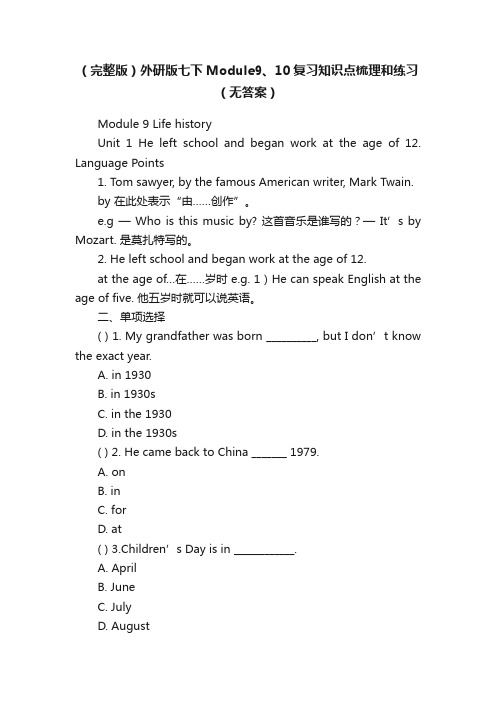
(完整版)外研版七下Module9、10复习知识点梳理和练习(无答案)Module 9 Life historyUnit 1 He left school and began work at the age of 12. Language Points1. Tom sawyer, by the famous American writer, Mark Twain.by 在此处表示“由……创作”。
e.g — Who is this music by? 这首音乐是谁写的?—It’s by Mozart. 是莫扎特写的。
2. He left school and began work at the age of 12.at the age of…在……岁时 e.g. 1)He can speak English at the age of five. 他五岁时就可以说英语。
二、单项选择( ) 1. My grandfather was born __________, but I don’t know the exact year.A. in 1930B. in 1930sC. in the 1930D. in the 1930s( ) 2. He came back to China _______ 1979.A. onB. inC. forD. at( ) 3.Children’s Day is in ____________.A. AprilB. JuneC. JulyD. August( )4. The math problem is too difficult. I can’t _________ the answer.A. findB. look atC. find outD. look for( )5. Can you pass me today’s ____________? I want to read the news.A .real B. date C. newspaper D. writerUnit 2 He decided to be actor.Language PointsShakespeare went to London and joined a theatre company in about 1592.join意思是“加入,参加”。
- 1、下载文档前请自行甄别文档内容的完整性,平台不提供额外的编辑、内容补充、找答案等附加服务。
- 2、"仅部分预览"的文档,不可在线预览部分如存在完整性等问题,可反馈申请退款(可完整预览的文档不适用该条件!)。
- 3、如文档侵犯您的权益,请联系客服反馈,我们会尽快为您处理(人工客服工作时间:9:00-18:30)。
外研版七年级下册module 9重点内容总结【语法】不规则动词的一般过去时用法。
不规则动词过去式构成方式独特,因此需要特殊记忆。
如:①We left at nine o’clock in the morning.我们是早上9点钟离开的。
②They swam in the swimming pool and had a good time.他们在游泳池里游泳,玩得很开心。
③He wrote some postcards and sent some emails.他写了一些明信片,还发了一些电子邮件。
以下列举一些常用的不规则动词及其过去式。
be--was\were leave--leftbuy--bought meet--metcome--came read--readdo--did see--sawget--got spend--spentgo--went swim--swamhave--had write--wrotetake--took send--sentbring--brought put--put除了过去式的变化规则不同以外,不规则动词在肯定句、否定句、疑问句等各种句型中的使用与规则动词相同。
下面我们以spend,come,go,take,see,swim为例具体说明:【重点词汇】marry v. 结婚◆ He married in 1582 and had three children.他在1582年结婚并且有三个孩子。
◆ She married John last year. 她去年嫁给约翰了。
◆ She got married to a young man named Frank.她嫁给了一个叫弗兰克的年轻人。
【探究总结】marry的用法(1)用作及物动词构成短语:marry sb. 意为“和某人结婚”marry sb. to. . . 意为“把某人嫁给…”。
(2)用作不及物动词,一般用副词或介词短语来修饰。
常构成短语:get married to sb. 意为“和某人结婚”,与marry sb.同义。
join v. 参加;加入◆ When he was 28, he went to London and joined a theatre company.当他28岁时,他去伦敦加入了一家戏剧公司。
◆ May I join in the game? 我可以参加这个游戏吗?◆ You live with an American family, and you take part in American life. 你和美国家庭一起生活,并参与美国生活。
【探究总结】take part in/join /join in辨析take part in参加或参与会议、游行、战争等群众性的活动,并在其中发挥一定作用;join参加某组织或团体,并成为其中一员;join in参加竞赛、游戏等活动,后面一般接名词或动词-ing形式。
常用短语:Join the army参军join the party入党Join sb. In doing sth.加入某人做某事work 工作;著作work作名词,意为“工作;作品;著作”。
可作可数名词或不可数名词,区别如下:◆work表示“工作”时,是不可数名词。
◆表示“作品”时,有时可数有时不可数。
其区别是:若表示人们的手工制作品,如工艺品、刺绣品等,是不可数名词;若表示文学家、艺术家、音乐家等的“作品”“著作”,则是可数名词。
◆work&job当“工作”讲时:Work不可数,侧重工作的内容;Job可数,侧重工作的种类。
如:--What’s your job?--A doctor.I love my job very much,it brings me so much happiness.You must finish y our work before ten o’clock.successful adj. 成功的◆ He became a successful actor and began to write plays.他成了一位成功的演员并且开始写戏剧。
◆ My uncle succeeded in getting the job.我叔叔成功地获得了那份工作。
◆ What’s the secret of your success?你成功的秘诀是什么?【探究总结】有关“成功”的词汇小结succeed动词,意为“成功, 办妥; 获得成效”常构成短语:succeed in doing sth./sth. 意为“成功做某事”success名词,意为“成功;成功的人(或事)”常构成短语:have success in sth. /in doing sth. 意为“在某方面获得成功”successful形容词,意为“成功的”常构成短语:be successful in doing sth. 意为“成功做某事”【串联记忆】success (n. )+ful→successful (adj. )+ly→successfully (adv. )复数单词所有格的构成◆规则单词的复数形式,在其后直接加“’”即可。
如:girls’ bags女孩子们的包◆不规则单词的复数形式,以s结尾的,其所有格也是在其后直接加“’”即可。
◆不规则单词的复数形式,如果不以s结尾,其所有格是在其后加’s。
如:women’s shop妇女商店children’s park儿童公园at the age of... 在……岁时at the age of是介词短语,意为“在…岁时”,常在句中作时间状语。
它可以与when sb. was...进行同义转换。
◆John went to Beijing at the age of 18.=John went to Beijing when he was 18.约翰在18岁时去了北京。
◆ He left school and began work at the age of 12.他在12岁时离开学校,开始工作。
◆ He became a doctor when he was 27 years old.他27岁时成了一名医生。
【探究总结】at the age of /by the age of 的用法辨析at the age of在…岁时, 后面接基数词,用作时间状语相当于when sb. be. . . (years old),常用于一般过去时。
by the age of到…岁时, 后面接基数词,用作时间状语强调到某一时刻为止的结果,常用于过去完成时或将来完成时。
◆You will have learned more than 2, 000 English words by the age of fourteen.到你十四岁的时候,你将学会2, 000多个英语单词。
find与find outfind意为“找到”,指偶然发现或寻找到某人或某物;find out意为“发现;查明;弄清”,指通过调查、询问等查明情况或弄清事实真相。
◆You can find the answer.你们能找到答案的。
◆At last we found out the truth of that thing.最后我们查明了那件事情的真相。
as well也◆He went to Europe as well. 他还去了欧洲。
◆Tom climbed the hill yesterday, too. /Tom also climbed the hill yesterday.汤姆昨天也去爬山了。
◆He didn’t go there, either. 他也没去那里。
【探究总结】as well/ too/also/either 辨析as well用于肯定句中,通常位于句末。
too用于肯定句中,通常位于句末,常用逗号和前面的部分隔开。
also用于肯定句中,通常位于句中。
either用于否定句中,通常位于句末,常用逗号和前面的部分隔开。
as well as 并且;还◆I as well as they am ready to help you.不仅他们愿意帮助你,我也愿意帮助你。
◆Lucy sings as well as her sister.露西和她姐姐唱得一样好。
【探究总结】as well as的两种用法“并且;还”可连接并列的词或短语,连接并列的谓语动词时,它们的时态应保持一致;as well as 连接并列主语时,谓语动词的数和前一个主语保持一致;也可以表示“和…一样好”用来表示同级比较【特别提醒】as well as 与as well的区别as well as是连词词组,用来连接句子中并列的词、短语和句子等;as well是副词词组,常用于肯定句句尾,表示“还,也”等意思。
【重点语句】Spring Festival is in January or February.春节在1月或2月。
in January or February意为“在1月或2月”,在月份前用介词in。
如:We often fly kites in March.我们经常在3月放风筝。
【注意】◆如果在月份的前面加了last, next, this, every等词,介词in要省略。
如:I went to visit my aunt last May.去年五月我去看望过我姑姑。
◆当月份后面有日期时,其前应用介词on。
如:They are going to have a football match on September 8th this year. 他们打算今年9月8日举办一场足球赛。
